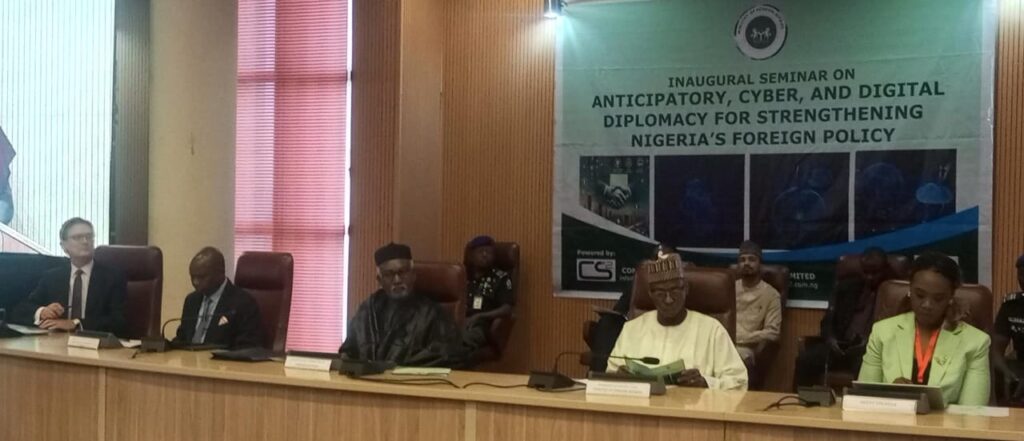-
Launches Anticipatory, Cyber, Digital Diplomacy Masterclass Series for diplomats
From Aidoghie Paulinus, Abuja
The Federal Government has set up a Cyber Diplomacy Unit in the Ministry of Foreign Affairs to combat threats arising from the digital space.
This was even as the government launched the Anticipatory, Cyber, and Digital Diplomacy Masterclass Series for diplomats from Africa and the Global South.
The Minister of Foreign Affairs, Yusuf Maitama Tuggar, announced the development while delivering a keynote address at a seminar on Anticipatory, Cyber, and Digital Diplomacy in Abuja.
Tuggar said the initiative was designed to strengthen Nigeria’s foreign policy architecture and equip diplomats with the necessary tools to confront the challenges of the emerging digital age.
He noted that the world is living through a historic transformation, adding that the convergence of disruptive technologies, shifting geopolitical alignments, and deepening digital interdependence is redefining the foundations of diplomacy.
Tuggar further said from artificial intelligence and quantum computing to the geopolitics of data and the militarisation of cyberspace, the very nature of statecraft is being rewritten before our eyes.
He also said Nigeria must not be a mere bystander but must act with purpose to position the country as a principled, capable, and forward-looking actor in the evolving global digital order.
“This requires embedding anticipatory, cyber, and digital diplomacy into the core of our foreign service, our national security architecture, and our multilateral engagements.
“Anticipatory diplomacy provides us with the ability to detect early warning signals, foresee systemic shocks, and plan strategically for the future, whether in the global race for critical minerals, the regulation of artificial intelligence, or the restructuring of global supply chains. Our diplomats must be trained, not merely to react, but to influence events before they unfold,” Tuggar said.
Speaking further, Tuggar said in Nigeria, the last government found itself searching for agreement with partners in Europe to tackle hate speech.
He recalled that at one point, a major social media platform was suspended, and more recently, when technology got ahead of regulation, crypto provided a safe financial space for kidnappers, violent extremists, organ traffickers, and other criminals.
According to Tuggar, “Billions of dollars left the country in the first quarter of 2024.
“These are the real-world consequences of the changes we see: lives lost, futures ruined, an anonymous few hijacking the welfare of the many. Viral but fake memes of leaders romancing rock stars, viral but fake reports of coups or deaths—people no longer know what to believe, which is a short step away from believing nothing. Laws and regulations are important but typically behind the digital curve. The purpose of cyber diplomacy is to help systems catch up, to promote the best technology can do to accelerate growth, stability, and freedom.
“In the spirit of this forward-looking vision, the Ministry of Foreign Affairs has established a dedicated Cyber Diplomacy Unit. The Unit’s mandate is clear: to coordinate Nigeria’s cyber-related foreign policy across all diplomatic platforms, build capacity for cyber negotiations, champion ethical and inclusive digital governance, foster public–private partnerships for national cyber resilience, and ensure that Nigeria’s voice is influential in global cyberspace governance.”
In his goodwill message, the Attorney General of the Federation and Minister of Justice, Lateef Fagbemi, said the seminar’s theme is essential to national security, economic prosperity, and the future of diplomacy in an increasingly complex and digital world.
“You will agree with me that the 21st century has introduced a paradigm shift in the nature of conflict, communication, and cooperation, demanding a fundamental transformation of traditional statecraft. The rise of a globally interconnected digital landscape presents both unprecedented opportunities and complex challenges, rendering traditional diplomatic methods insufficient. As Nigeria’s Chief Law Officer, the Ministry of Justice is positioned to address this new reality with strategies that are proactive, technologically astute, and ethically grounded,” Fagbemi said.
Fagbemi further said the Federal Ministry of Justice had a crucial role to play in the new diplomatic paradigm, adding that the work is to ensure legal frameworks are updated to address the emerging challenges.
“The Ministry is committed to collaborating with security agencies, foreign affairs officials, the private sector, and civil society to build a comprehensive and effective strategy,” Fagbemi said.


